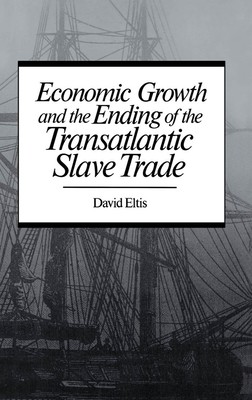
- We will send in 10–14 business days.
- Author: David Eltis
- Publisher: Oxford University Press, USA
- ISBN-10: 0195041356
- ISBN-13: 9780195041354
- Format: 16.1 x 23.5 x 3.4 cm, hardcover
- Language: English
- SAVE -10% with code: EXTRA
Reviews
Description
This watershed study is the first to consider in concrete terms the consequences of Britain's abolition of the Atlantic slave trade. Why did Britain pull out of the slave trade just when it was becoming important for the world economy and the demand for labor around the world was high? Caught between the incentives offered by the world economy for continuing trade at full tilt and the ideological and political pressures from its domestic abolitionist movement, Britain chose to withdraw, believing, in part, that freed slaves would work for low pay which in turn would lead to greater and cheaper products. In a provocative new thesis, historian David Eltis here contends that this move did not bolster the British economy; rather, it vastly hindered economic expansion as the empire's control of the slave trade and its great reliance on slave labor had played a major role in its rise to world economic dominance. Thus, for sixty years after Britain pulled out, the slave economies of
Africa and the Americas flourished and these powers became the dominant exporters in many markets formerly controlled by Britain. Addressing still-volatile issues arising from the clash between economic and ideological goals, this global study illustrates how British abolitionism changed the tide of economic and human history on three continents.
EXTRA 10 % discount with code: EXTRA
The promotion ends in 18d.17:50:17
The discount code is valid when purchasing from 10 €. Discounts do not stack.
- Author: David Eltis
- Publisher: Oxford University Press, USA
- ISBN-10: 0195041356
- ISBN-13: 9780195041354
- Format: 16.1 x 23.5 x 3.4 cm, hardcover
- Language: English English
This watershed study is the first to consider in concrete terms the consequences of Britain's abolition of the Atlantic slave trade. Why did Britain pull out of the slave trade just when it was becoming important for the world economy and the demand for labor around the world was high? Caught between the incentives offered by the world economy for continuing trade at full tilt and the ideological and political pressures from its domestic abolitionist movement, Britain chose to withdraw, believing, in part, that freed slaves would work for low pay which in turn would lead to greater and cheaper products. In a provocative new thesis, historian David Eltis here contends that this move did not bolster the British economy; rather, it vastly hindered economic expansion as the empire's control of the slave trade and its great reliance on slave labor had played a major role in its rise to world economic dominance. Thus, for sixty years after Britain pulled out, the slave economies of
Africa and the Americas flourished and these powers became the dominant exporters in many markets formerly controlled by Britain. Addressing still-volatile issues arising from the clash between economic and ideological goals, this global study illustrates how British abolitionism changed the tide of economic and human history on three continents.


Reviews